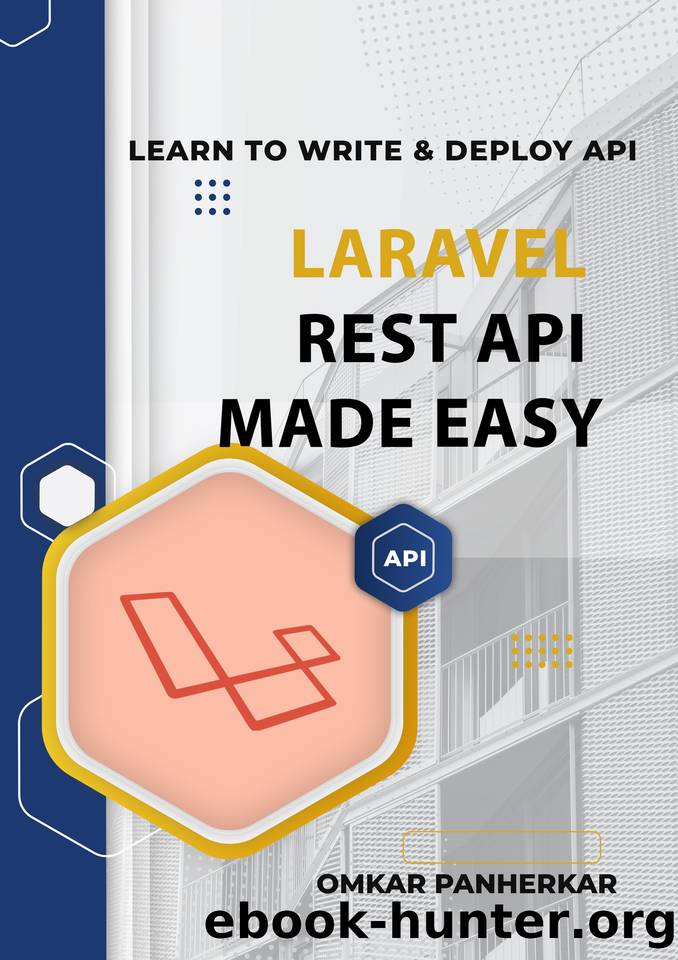Laravel REST API Made Easy: LEARN TO WRITE FLUENT LARAVEL API with Omkar Panherkar (Become Full Stack Developer Book 2) by Panherkar Omkar

Author:Panherkar, Omkar
Language: eng
Format: epub
Published: 2023-01-15T00:00:00+00:00
Chapter 10. Advanced topics in Laravel API development such as Caching and Event handling
As your Laravel API grows and evolves, you may find that you need to implement more advanced features to optimize performance, improve scalability, and add new functionality. In this chapter, we'll discuss two advanced topics in Laravel API development: caching and event handling.
First, let's talk about caching. Caching is a technique that allows you to store frequently-used data in memory, so that it can be quickly retrieved without having to go back to the database or other data source. This can significantly improve the performance of your API, especially if you have a lot of read-heavy operations.
Laravel provides built-in support for caching, making it easy to add caching to your API. One popular method for caching in Laravel is using the built-in "Cache" facade.
<?php
use Illuminate\Support\Facades\Cache;
class UserController extends Controller
{
public function index()
{
$users = Cache::remember('users', 60, function () {
return User::all(); });
return $users;
}
}
In the example above, we're using the "remember" method of the "Cache" facade to cache the result of the "User::all()" query for 60 minutes. This means that if the same request is made within 60 minutes, the cached result will be returned, rather than querying the database again.
Another advanced topic in Laravel API development is event handling. Events are a way to send notifications or trigger actions when certain events occur in your application. This allows you to decouple different parts of your application, making it more modular and easier to maintain.
Laravel provides built-in support for events, making it easy to add event handling to your API. You can use the built-in "Event" facade to trigger events, and the "EventServiceProvider" to listen for events and register event handlers.
Copy code
Event::listen('user.registered', function ($user) {
// send welcome email
});
Download
This site does not store any files on its server. We only index and link to content provided by other sites. Please contact the content providers to delete copyright contents if any and email us, we'll remove relevant links or contents immediately.
| Ajax | Assembly Language Programming |
| Borland Delphi | C & C++ |
| C# | CSS |
| Compiler Design | Compilers |
| DHTML | Debugging |
| Delphi | Fortran |
| Java | Lisp |
| Perl | Prolog |
| Python | RPG |
| Ruby | Swift |
| Visual Basic | XHTML |
| XML | XSL |
The Mikado Method by Ola Ellnestam Daniel Brolund(23572)
Hello! Python by Anthony Briggs(22707)
Secrets of the JavaScript Ninja by John Resig Bear Bibeault(21526)
Kotlin in Action by Dmitry Jemerov(20570)
Dependency Injection in .NET by Mark Seemann(20491)
The Well-Grounded Java Developer by Benjamin J. Evans Martijn Verburg(20388)
OCA Java SE 8 Programmer I Certification Guide by Mala Gupta(19537)
Algorithms of the Intelligent Web by Haralambos Marmanis;Dmitry Babenko(18334)
Grails in Action by Glen Smith Peter Ledbrook(17458)
Adobe Camera Raw For Digital Photographers Only by Rob Sheppard(16976)
Test-Driven iOS Development with Swift 4 by Dominik Hauser(11242)
Becoming a Dynamics 365 Finance and Supply Chain Solution Architect by Brent Dawson(8072)
Microservices with Go by Alexander Shuiskov(7841)
Practical Design Patterns for Java Developers by Miroslav Wengner(7739)
Test Automation Engineering Handbook by Manikandan Sambamurthy(7705)
Angular Projects - Third Edition by Aristeidis Bampakos(7184)
The Art of Crafting User Stories by The Art of Crafting User Stories(6642)
NetSuite for Consultants - Second Edition by Peter Ries(6562)
Demystifying Cryptography with OpenSSL 3.0 by Alexei Khlebnikov(6327)
